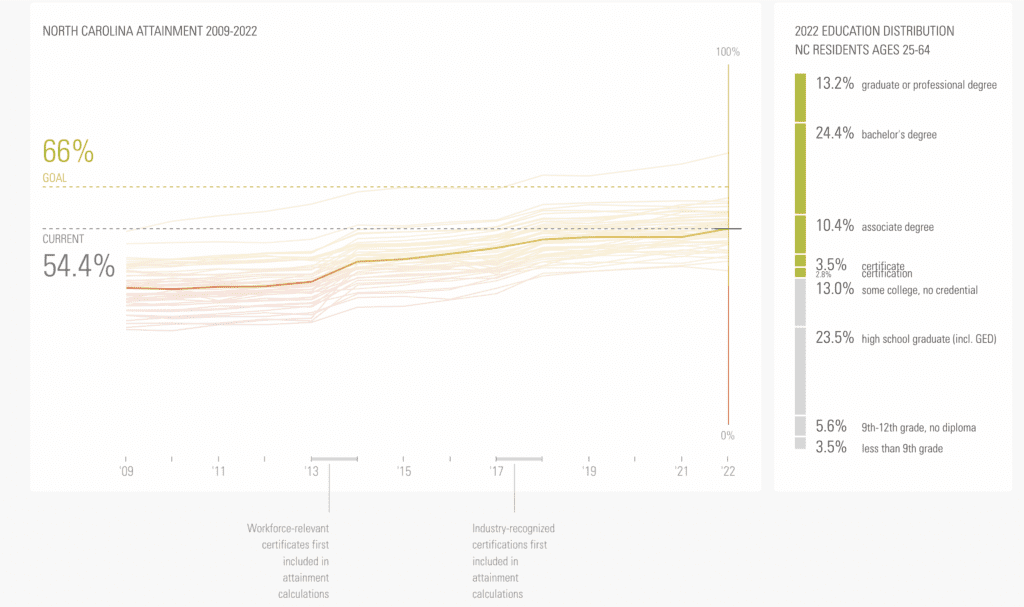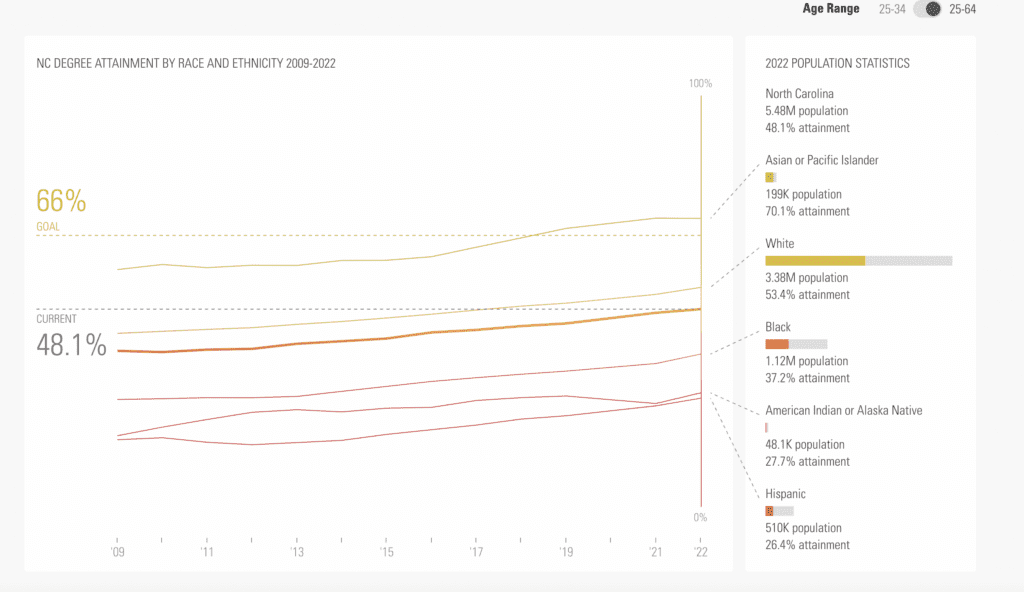North Carolina sees increase in adult educational attainment
February 26, 2024 2024-02-26 21:25North Carolina sees increase in adult educational attainment
by EdNC:
Adults in North Carolina are earning more degrees and credentials, according to new federal data released by Lumina Foundation. Lumina’s annual Stronger Nation report shows 54.4% of working-age adults (ages 25 to 64) in North Carolina have earned a postsecondary degree or credential of value, roughly equivalent to the national attainment rate of 54.3%. The report is based on data from the U.S. Census Bureau’s American Community Survey in 2022.
North Carolina’s credential attainment rate increased 2.3%, making it one of three states along with Washington, D.C. to see an increase of at least 2% from 2021 to 2022.
In 2009, Lumina found that 38.1% of 25 to 64 year-old working-age adults had earned an associate, bachelor’s, graduate, or professional degree. In 2014, Lumina added certificates to their data tracking, and in 2018, they added certifications. From 2018 to 2022, the overall national attainment rate increased 3%.
While more adults are earning degrees and degree attainment increased among all races and ethnicities from 2021 to 2022, ethnic and racial disparities remain.
According to the report, degree attainment among Black, Hispanic, Latino, and Native American adults is significantly below the national average, and that pattern holds true in North Carolina as well.
During a webinar to introduce the report, Dr. Ted Mitchell, president of the American Council on Education, expressed his joy for the results, particularly amid concerns that college no longer matters to students and higher education is in decline.
“It showed that college matters,” Mitchell said. “The economics behind the report that you’re (Lumina) doing showed that college continues to matter to students, and it matters a lot to minoritized populations.”
And while the report shows progress, Mitchell highlighted areas that need to be addressed, including persistence between freshman and sophomore year, differences in graduation rates by race/ethnicity, job satisfaction and employment after college, and student debt.
“The declining confidence in higher education has a lot to do with rhetoric, but it also has to do with some things that we aren’t doing very well,” he said.
North Carolina’s progress and attainment gaps
Since 2009, North Carolina’s educational attainment rate for 25 to 64 year-olds has increased by 16.5%. In the chart below, you can see the historical increase in North Carolina’s educational attainment rate as well as how it breaks down in 2022 between graduate and professional degrees, bachelor’s degrees, associate degrees, certificates, and certifications.
The most notable attainment increase in 2022 was in certificates — the report shows an increase in certificates from 2.2% in 2021 to 3.5% in 2022.

In North Carolina, 48.1% of all racial and ethnic groups have earned an associate degree or higher. However, attainment gaps exist, particularly among Black (37.2%), Hispanic (26.4%), and American Indian or Alaska Native (27.7%) adults.
You can view degree attainment by race and ethnicity for the state here and the nation here.

How this compares to myFutureNC’s recent attainment report
In 2019, North Carolina announced a statewide attainment goal of 2 million North Carolinians ages 25 to 44 with a high-quality credential or postsecondary degree by 2030. Since then, myFutureNC has been leading efforts to meet that goal, including tracking attainment data with the help of Carolina Demography.
On Feb. 15, 2024, myFutureNC released a new report on the state of educational attainment in North Carolina.
“From 2019 to 2022, the state has increased overall educational attainment by 4 percentage points from 53.4% to 57.4%,” the report reads. “But, most recent data show we still remain 391,900 away from 2 million, and are tracking 24,096 behind where we needed to be at this point in time to reach the goal.”
The difference between the Lumina Foundation attainment rate of 54.4% and myFutureNC’s attainment rate of 57.4% is due to differences in the underlying populations. According to myFutureNC, their state-level reporting tracks attainment data of those ages 25 to 44 whereas Lumina Foundation looks at attainment data for individuals ages 25 to 64, which explains the difference in the two reports’ attainment rates.
North Carolina’s efforts to engage adult learners
Numerous efforts are underway to fill gaps in credential attainment. In 2021, myFutureNC joined together with the John M. Belk Endowment and the Belk Center for Community College Leadership and Research to launch N.C. Reconnect, a pilot project with five North Carolina community colleges to reengage adult learners who had previously attended community college but left before earning a credential. Since N.C. Reconnect’s launch, the initiative has grown to include 20 community colleges across North Carolina.
What continues to emerge from these efforts are promising practices and strategies to reenroll and retain adult learners, defined as students ages 25 and older.
EdNC, along with the Belk Center, have interviewed dozens of presidents, staff, and adult learners about their experiences.
College leaders reiterate the importance of multiple points of entry for adult learners – more on-ramps for students to enroll or reenroll. But it’s more than on-ramps. Students must also merge, and those can be scary moments for adult learners.


